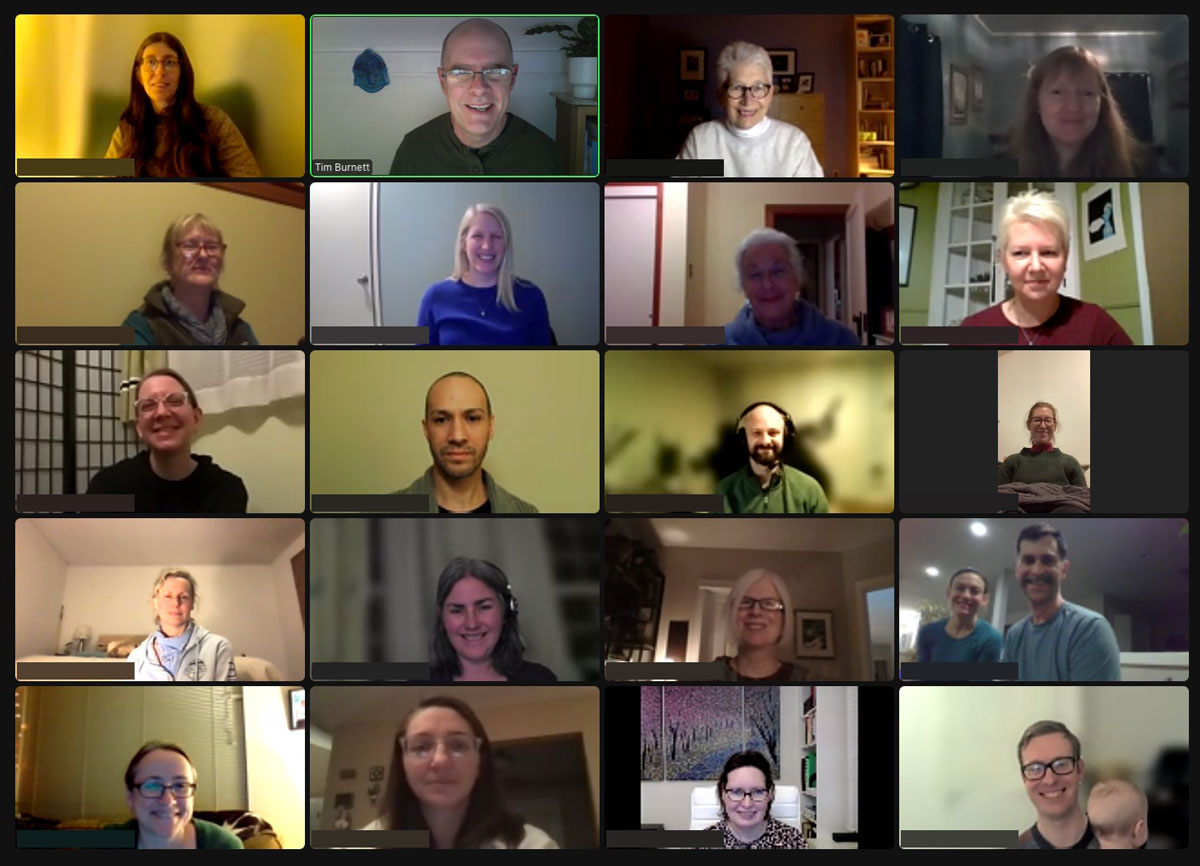WHY MBSR?
Life moves fast, demands are constant, and stress can feel unrelenting. Many people juggle work, family, and personal responsibilities while navigating anxiety, chronic pain, or a sense of overwhelm. Finding balance and presence in the midst of it all can seem out of reach.
The Mindfulness-Based Stress Reduction (MBSR) course offers a practical, evidence-based approach to cultivating mindfulness. Whether you’re new to mindfulness or looking to deepen your practice, MBSR provides the time, guidance, and hands-on experience needed to integrate mindfulness into daily life in a meaningful way.
WHAT TO EXPECT
This 8-week course includes:
- Understanding stress reactivity and how mindfulness fosters resilience
- Learning about the nervous system and techniques that support individual self-regulation
- Applying mindfulness to everyday situations, including communication
- Guided instruction in meditation practices
- Body awareness techniques, including the body scan and gentle mindful movement
- Group discussions and small-group exercises
- A 70-page workbook with readings, course guidance, and additional resources
- Eight weekly 2.5-hour sessions plus a 7-hour weekend retreat
The eight class sessions include lessons on what mindfulness is and how to apply it to real life situations, sitting and walking meditation, small and whole group discussions, gentle yoga-based movement, and other practices. In between classes, home practice and explorations support the growth of mindfulness in your life. And there’s an additional retreat session on the weekend to deepen your practice.
BENEFITS OF MBSR
- Reduces symptoms of anxiety and depression: Research shows that MBSR is an effective intervention for reducing the symptoms of anxiety and depression, helping individuals manage emotional distress and cultivate resilience (Hoge et al., 2013; Goyal et al., 2014).
- Improves stress management: MBSR helps participants recognize and manage their stress response, leading to improved emotional regulation and the ability to handle challenging situations with greater calm and clarity (Kabat-Zinn, 1990).
- Enhances overall well-being: Mindfulness practice through MBSR has been shown to promote a greater sense of physical and emotional well-being, including increased energy, focus, and a positive outlook (Creswell, 2017).
- Increases self-awareness: Through mindfulness meditation and reflection, participants gain insight into their habitual patterns of thought and behavior, leading to more conscious choices and greater alignment with personal values (Zeidan et al., 2010).
- Improves emotional regulation: By learning techniques to self-regulate the nervous system, participants can better manage intense emotions, reduce reactivity, and develop more balanced emotional responses (Hölzel et al., 2011).
- Fosters mindfulness in everyday life: MBSR emphasizes applying mindfulness to everyday activities such as communication, eating, and walking, helping individuals integrate mindfulness into their daily routines (Kabat-Zinn, 1990).
- Supports physical health: Studies have also shown that MBSR can reduce physical symptoms related to stress, such as chronic pain, high blood pressure, and insomnia (Cherkin et al., 2016).
References:
- Cherkin, D. C., et al. (2016). Effect of Mindfulness-Based Stress Reduction vs Cognitive Behavioral Therapy or Usual Care on Back Pain. JAMA.
- Creswell, J. D. (2017). Mindfulness Interventions. Annual Review of Psychology.
- Goyal, M., et al. (2014). Meditation Programs for Psychological Stress and Well-being: A Systematic Review and Meta-analysis. JAMA Internal Medicine.
- Hölzel, B. K., et al. (2011). Mindfulness Practice Leads to Increases in Regional Brain Gray Matter Density. Psychiatry Research: Neuroimaging.
- Hoge, E. A., et al. (2013). Mindfulness Meditation and Social Stress in Healthy Immune-Resilient Adults. Psychosomatic Medicine.
- Kabat-Zinn, J. (1990). Full Catastrophe Living: Using the Wisdom of Your Body and Mind to Face Stress, Pain, and Illness. Delta.
- Zeidan, F., et al. (2010). Mindfulness Meditation Improves Cognition: Evidence of Brief Mental Training. Consciousness and cognition.
TEACHER
SCHEDULE
Mondays, September 22 – November 10, 2025
4 – 6:30pm PT
All-Day Retreat (Online):
Sunday, November 2, 9am – 4pm PT
COST
$415 - $625 (or $104 – $156/month)
- Sliding scale: Choose what’s right for you.
- Payment plan option: 4-months, no-interest.
- Scholarships available: No need to apply; just choose a scholarship tuition during registration.
Attend with a Friend Discount
When you and a friend both register for this class, you can both take 10% off! Use code "MindfulFriends" at checkout.
Meet Your Instructor
This course is applicable to everything. Just the knowledge that I can approach life with curiosity and openness helps tremendously. Little by little, I am realizing that my choices are not always as limited as I think they are, and I am learning to relax and let things go.
CONTINUING EDUCATION IS AVAILABLE
CE Credits: American Psychological Association approved credits are available for Psychologists, MFTs, LPCCs, LEPs, and LCSWs.
BRN Credits: Board of Registered Nursing approved credits are available for Nurses.
More on Continuing Education
Continuing Education Credit is available for many professions:
- In our 8-week MIndfulness-Based Stress Reduction (MBSR) and Mindful Self-Compassion (MSC) courses, APA CE's & BRN's are available for psychologists, nurses, MFTs, LPCCs, LEPs, and LCSWs. Note that requests for continuing ed after a course has begun incur a $50 late fee.
- in our 5-week Mindfulness for Healthcare Professionals (MHP) course, CME credit is available for physicians, nurses, and other healthcare professionals.
Regarding partial attendance:
- For APA CE's (MBSR & MSC), complete attendance of the course is required. We can sometimes offer make-up classes in a parallel course, but this is not always available. If you know you will miss a session, we recommend that you wait to register for a series when you can plan to attend all sessions.
- For CME's, the attendance requirement is more flexible: credit can be pro-rated to the number of hours you attend.
Scroll to CE details for MHP | MBSR | MSC
5-week Mindfulness for Healthcare Providers (MHP) Course
Physicians, nurses, therapists, and social workers: PeaceHealth St. Joseph designates this live activity for a maximum of 16.25 AMA PRA Category 1 Credits™. It meets the criteria for Category I CME credit to satisfy the relicensure requirements of the Washington State Medical Quality Assurance Commission.
Learning Objectives for the 5-week Mindfulness for Healthcare Providers Course. After this education, learners should be able to:
- Choose appropriate mindfulness training techniques in preventive and responsive ways in high-stress situations.
- Utilize appropriate mindfulness practices to mitigate the risk factors for burnout.
- Discuss strategies with peers for a more positive, mindful engagement in work and home situations that have previously triggered stress response and unhelpful behaviors.
- Identify helpful vs. unhelpful thought patterns, problem solving, emotional regulation, and meaning-focused coping strategies.
- Demonstrate meaningful change in personal mindfulness, perceived stress, and burnout as shown in standardized measures administered pre- and post-activity.
8-week Mindfulness-Based Stress Reduction (MBSR) Course
Psychologists: Up to 27.0 CE Continuing Education Credits for this program are provided by UC San Diego Center for Mindfulness. The UC San Diego Center for Mindfulness is approved by the American Psychological Association to sponsor continuing education for psychologists. The UC San Diego Center for Mindfulness maintains responsibility for this program and its content.
Licensed MFTs, LPCCs, LEPs, LCSWs: Up to 27.0 Continuing Education Credits for this program are provided by UC San Diego Center for Mindfulness. The UC San Diego Center for Mindfulness is approved by the American Psychological Association to sponsor continuing education for psychologists. 27.0 CE credit may be applied to your license renewal through the California Board of Behavioral Sciences.
Nurses: UC San Diego Center for Mindfulness is approved by the California Board of Registered Nursing, Provider Number CEP16351, for 32.0 contact hours.
UCSD CE Learning Objectives for the 8 week Mindfulness-Based Stress Reduction (MBSR) course:
- Articulate the key aspects of mindfulness as it relates to stress reduction, coping with pain and illness and enhancing well-being
- Differentiate MBSR from relaxation and other distraction techniques that may seem similar but are fundamentally and theoretically quite different in contending with difficulty and enhancing quality of life
- Apply mindfulness techniques in both personal and professional settings as a means of contending more effectively with the demands of both settings
- Integrate mindfulness into social interaction with patients, colleagues, supervisors, family and friends to facilitate more effective and mindful communication
- Articulate the potential benefits of mindfulness-based stress reduction (and mindfulness in general) to educate patients and their families about the benefits of such programs in their own lives
- Implement brief mindfulness practices with patients and family members as a means of contending with acute pain, anxiety and distress.
CE Registrants are responsible for completing all requirements for attendance or making up missed classes, as well as completing the post class evaluation by no later than 3 days after the last class meeting. Failure to do so will result in forfeiture of CE’s.
8-week Mindful Self-Compassion (MSC) Course
Psychologists: Up to 24.0 Continuing Education Credits for this program are provided by UC San Diego Center for Mindfulness. The UC San Diego Center for Mindfulness is approved by the American Psychological Association to sponsor continuing education for psychologists. The UC San Diego Center for Mindfulness maintains responsibility for this program and its content.
Licensed MFTs, LPCCs, LEPs, LCSWs: Up to 24.0 Continuing Education Credits for this program are provided by UC San Diego Center for Mindfulness. The UC San Diego Center for Mindfulness is approved by the American Psychological Association to sponsor continuing education for psychologists. Credits may be applied to your license renewal through the California Board of Behavioral Sciences.
Nurses: UC San Diego Center for Mindfulness is approved by the California Board of Registered Nursing, Provider Number CEP16351, for 28.75 contact hours.
UCSD CE Learning Objectives for the 8-week Mindful Self-Compassion (MSC) class:
- Describe the theory and research supporting mindful self-compassion
- Develop and apply self-compassion practices to motivate themselves with encouragement rather than self-criticism
- Assess and manage difficult situations and emotions with greater moment-to-moment acceptance
- Develop and apply self-compassion practices to respond to feelings of failure or inadequacy with self-kindness
- Transform difficult relationships, old and new, through self-validation
- Utilize the art of savoring and self-appreciation to overcome negative attention bias
- Apply core mindfulness and self-compassion practices into daily life
- Demonstrate simple self-compassion practices to patients, students, or clients
CE Registrants are responsible for completing all requirements for attendance or making up missed classes, as well as completing the post class evaluation by no later than 3 days after the last class meeting. Failure to do so will result in forfeiture of CE’s.
More about MBSR
Mindfulness-Based Stress Reduction (MBSR) is the “gold standard” course for learning mindfulness and how to apply it to your daily life. It was designed by Jon Kabat-Zinn and the Center for Mindfulness at the UMass Medical Center in the late 1970’s. Please see our MBSR page for full details about this well-researched class.
Decades of research show that MBSR reduces chronic pain and boosts the immune system; addresses painful mental states like depression and anxiety; minimizes emotional reactivity and promotes well-being; increases flexible attention and sharpens mental focus; and actually thickens grey matter in the areas of empathy and problem-solving. Happiness can be a delightful by-product.
Preparing for MBSR
If you’re unsure about registering for a course, please contact the Mindfulness Northwest office. We want to be sure there is sufficient support for you and that the timing is right for taking our courses.
Wondering what this class is like? You can also sign up for a FREE 90 minute introduction to mindfulness:

Less Overwhelm, More Ease: An Evening of Mindfulness

Less Overwhelm, More Ease: An Evening of Mindfulness
The opportunity to practice mindfulness skills and obtain peace and calm during this very stressful time is priceless. An added benefit was the camaraderie and community spirit that was experienced amongst fellow mindfulness students, even within a virtual classroom environment. Not only did I learn mindfulness practices and techniques that I could use for my own benefit, but I was able to share what I learned with my clients during counseling sessions.
Register for this program
Please log in
if you have an account


